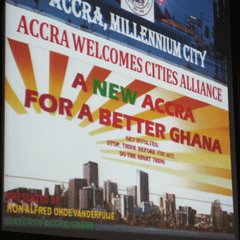
|
| Photo: Sebastian Sunderhaus/GIZ |
The recent Cities Alliance Executive Committee meeting in Accra, Ghana this past July provided an opportunity to highlight the diversity and breadth of the partnerships involved in the Ghana Country Programme.
The Ghana Land, Services and Citizenship (LSC) for the Urban Poor programme is a partnership initiative undertaken by the Government of Ghana and its support partners to align urban development efforts at the national, local and community levels, with a focus on the Greater Accra Metropolitan Area (GAMA).
It builds on the capacity that already exists in Ghana and utilises the strengths of various Cities Alliance members.
The lead partner is the Ministry of Local Government and Rural Development, primarily through its Urban Development Unit (UDU). The lead Cities Alliance member in the programme is GIZ, which has built strong links with the Ministry over a number of years.
The major partners include:
- The Urban Development Unit (UDU) of the Ministry of Local Government and Rural Development/GIZ. The UDU will coordinate and monitor the various partners involved in the LSC programme. It will also organise the Ghana Urban Forum, conduct follow-up research, and undertake public inclusivity awareness to spur dialogue on urban development in Ghana. GIZ is providing institutional capacity support to strengthen the UDU so that it has the capacity to perform its key role.
- The Institute of Local Government Studies (ILGS) is a Ghana-based research, advocacy and management development institution that promotes capacity building training and development. Its role in the LSC initiative is to deliver and coordinate capacity development for local authorities.
-
People’s Dialogue, a community-based NGO affiliated with Shack/Slum Dwellers International (SDI), is focusing on the community empowerment aspect of the LSC programme.A Country Programme is implemented through stakeholder partnerships, and its success relies on their strength.Its activities are centred around three major objectives: to increase the public knowledge and information on the urban poor settlements in GAMA by developing profiles of the settlements; strengthening communities’ capacity to engage in dialogue; and preparing for the establishment of a Community Social Investment Fund.Notably, the LSC activities build on what the People’s Dialogue has already been doing in Ghana, giving it the opportunity to build partnerships and scale up its efforts.
- The Kwame Nkrumah University of Science and Technology (KNUST) Department of Planning is coordinating the production of a State of Ghanaian Cities Report that will be used to inform urban development policy.
In addition, there are also a number of initiatives that are aligned with the LSC programme:
-
Through the Urban Back-Up initiative, GIZ will offer capacity development to ILGS, which will in turn deliver and coordinate capacity building for local authorities in 10 selected cities in Ghana so that they better manage pro-poor development processes. It essentially expands the principles of the LSC initiative beyond GAMA to cities throughout the country.
- The World Bank’s planned GAMA Water and Sanitation project seeks to increase access to safe water and improve sanitation to low income people in the Greater Accra area.
- A project of the Earth Institute at Columbia University, the Millennium Cities Initiative assists Sub-Saharan cities in their efforts to attain the Millennium Development Goals through a combination of research and policy analysis, and by working with local, domestic and international partners to stimulate economic and social development. The MCI is currently addressing planning, infrastructure, environmental and public health challenges in Accra.
-
The Slum Communities Achieving Livable Environments Through Urban Partners (SCALE-UP) initiative is an integrated slum upgrading project that has been implemented since 2007 in 11 slums in Accra as well as the city of Sekondi-Takoradi in western Ghana. It was launched by CHF International and is financed with a grant from the Bill and Melinda Gates Foundation.
-
The Neighborhood Infrastructure and Upgrading Facility (NUF) aims to collaborate on ways to bring more private sector investment into neighbourhood upgrading projects and home improvement in Accra as well as the cities of Kumasi and Secondi-Takoradi.
Related Information




